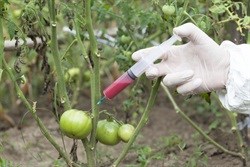
Top stories



ESG & Sustainability#BudgetSpeech2026: SRD grant unchanged, other Sassa social grants see hike
6 hours



More news











ESG & Sustainability
South Africa’s carbon tax should stay: climate scientists explain why











The 28 European Union nations have been deeply divided for years on the issue, with some such as France bluntly opposed and others such as Britain arguing that the technology cannot simply be ignored if Europe is to keep up with the rest of the world.
For want of a better solution, EU leaders thrashed out a compromise in June to hand the final decision back to national governments, even if a GMO product had been approved at EU level, and on Tuesday the Parliament's environment committee approved the new rules by 53 votes to 11.
Significantly, the committee dropped the leaders' recommendation that GMO companies be allowed to negotiate directly with member states for approval, a move welcomed by environmental groups that had feared the firms could exercise undue influence on governments.
"The measures approved today will secure flexibility for member states to restrict [and] ban the cultivation of GMO crops if they so wish," said MEP Frederique Ries of the Liberal and Democratic Alliance, who is steering the proposals through Parliament.
Member states rejecting a GMO crop will be able to cite environmental policy, town and country planning, land use, agricultural policy, public policy, or possible socio-economic impacts as reasons to refuse permission, a Parliamentary statement said.
Risk assessments by the European Food Safety Authority should now "take account of the direct, indirect, immediate, delayed and cumulative effects of GMOs on human health and the environment, and always take account of the precautionary principle," it added.
Environmental groups welcomed the committee vote.
MEPs "have radically improved the text adopted (in June) ... which was heavily influenced by the UK government pro-GMO stance," Greenpeace said.
"Today's vote would give European countries a legally solid right to ban GMO cultivation in their territory, making it difficult for the biotech industry to challenge such bans in court."
Cultivation of GMO foods has sparked widespread suspicion in the EU on health and environmental grounds even though the crops have won repeated safety approvals and are imported into the EU in large amounts for animal feed.
Several GMO crops have won EU approval but only Monsanto's MON810 maize is still grown after it was first cleared in 1998, with two other corn types plus BASF's Amflora potato abandoned.
Last year, US biotech giant Monsanto said it would no longer seek clearance for new GMO products in the EU.
Tuesday's package now returns to EU member states for further discussions before it comes back to Parliament for approval.

For more than two decades, I-Net Bridge has been one of South Africa’s preferred electronic providers of innovative solutions, data of the highest calibre, reliable platforms and excellent supporting systems. Our products include workstations, web applications and data feeds packaged with in-depth news and powerful analytical tools empowering clients to make meaningful decisions.
We pride ourselves on our wide variety of in-house skills, encompassing multiple platforms and applications. These skills enable us to not only function as a first class facility, but also design, implement and support all our client needs at a level that confirms I-Net Bridge a leader in its field.
Go to: http://www.inet.co.za